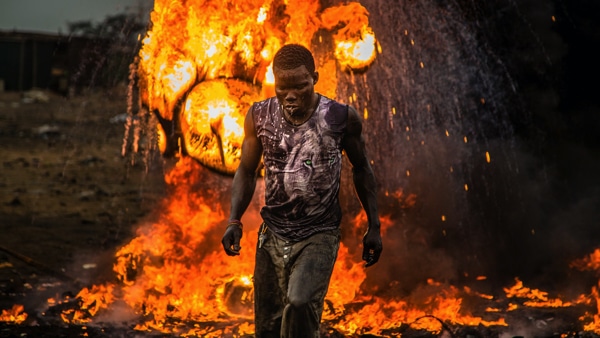
Dir.: Florian Weigensamer, Christian Krönes; Documentary; Austria 2018, 90 min.
Austrian directors/writers Florian Weigensamer and Christian Krönes are attracted to radical material, that brings to mind the work of their compatriot, the noted documentarian Michael Glawogger (1959-2014) Their first film A German Life, explored the life of 104 year-old Brunhilde Pomsel, Goebbels stenographer. Here they have chosen something completely different but just as fascinating. Near the Ghanaian capital Accra is Agbogbloshie a swampland, where 250 000 tons of first world electronic dump is ‘recycled’ by about 6000 women, men and children.
The title refers to the biblical place, and Agbogbloshie is certainly making its name proud. The ground itself is unsafe, it sucks people in – after all, it’s a lagoon. Starting with a close-up of a chameleon, emaciated goats and cows roam the wasteland, where ancient dump trucks discharge old computer monitors, TV sets, fridges, printers, mobiles and cars. The mostly teenage work force are looking for aluminium, copper or zinc, anything they can glean with their self-made magnets, working away with crude mallets to break down the chassis. When they have collected enough material they take it to the dealer, who weighs their collection, before trying – usually successfully – to cheat them, reducing a meagre payment even further. Woman and girls are used as water carriers, they too inhale the poisonous dirt, the earth squelches, their health gradually deteriorates. To take their mind off things there is rap music, and even a newspaper, the ‘Daily Graphic’. And oddities, like a make-shift funeral parlour selling some expensive coffins that nobody on the site can afford to buy. A gay Jewish man from Zimbawe sells used water packets.
But there is a sense of pride among the detritus: a teenage boy declares “it’s rubbish for them, but we are the best re-cyclers”. But the common goal is to make it to France, or anywhere in Europe, “and be somebody”. Only few would admit that “this place eats up your life very fast”. Flies and filth are everywhere as the sulphur clouds hang heavy on the air. Cholera and malaria are the inevitable outcome.
Sodom makes for grim viewing but the directors avoid making this a depressing documentary, and some of the artfully framed scenes have a strange appeal, such as those when the men are burning down the metal pipes. The film plays out almost like a poem to industrial waste, dumped from all over the world. But the well-crafted images fit well with the narrative, and the sophisticated sound design conjures up the spirit of those who work in this Armageddon. There may not be much hope here; but you watch in stark admiration, and a certain sense of shame that your next new gadget or smart phone will eventually end up polluted this dystopian hell hole and the people who spend their short lives dedicated to its daily grind. AS
WatchAUT | 13 -15 DECEMBER 2019 | Picturehouse Cinema W1